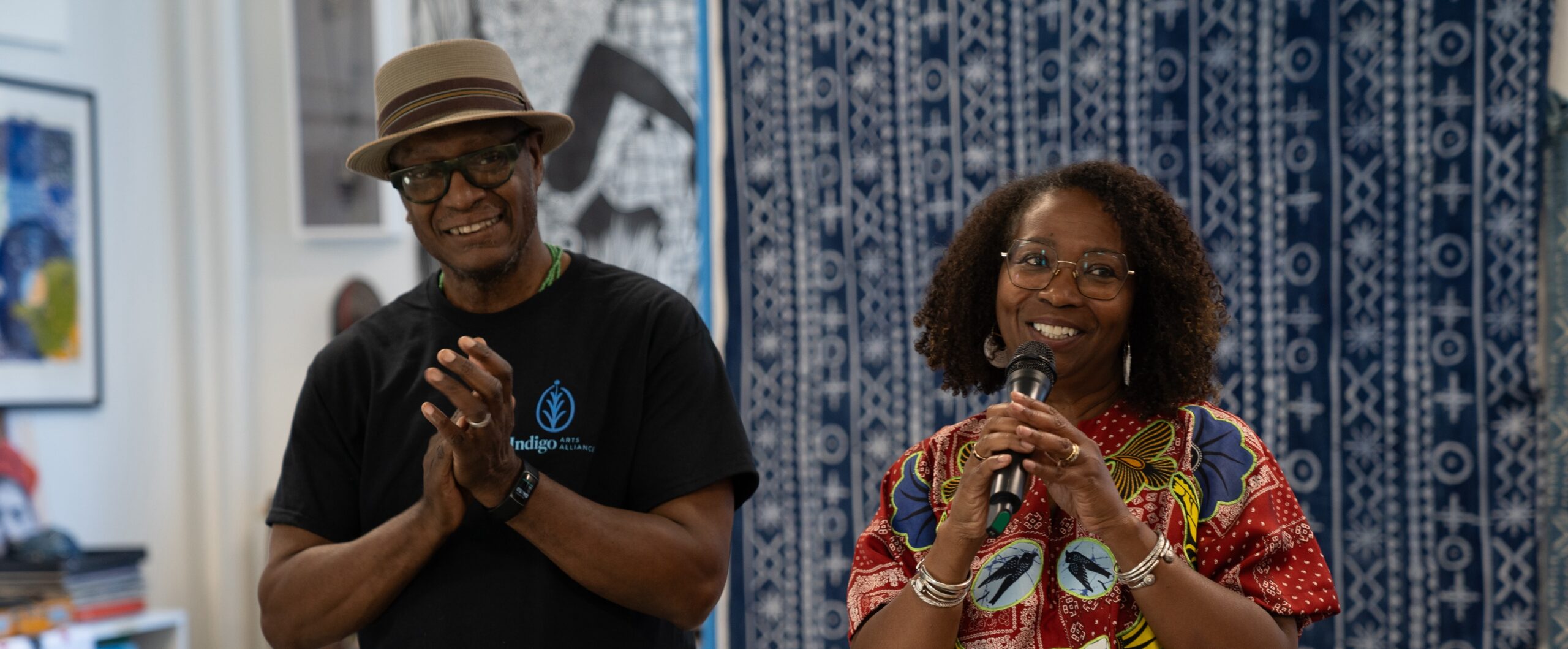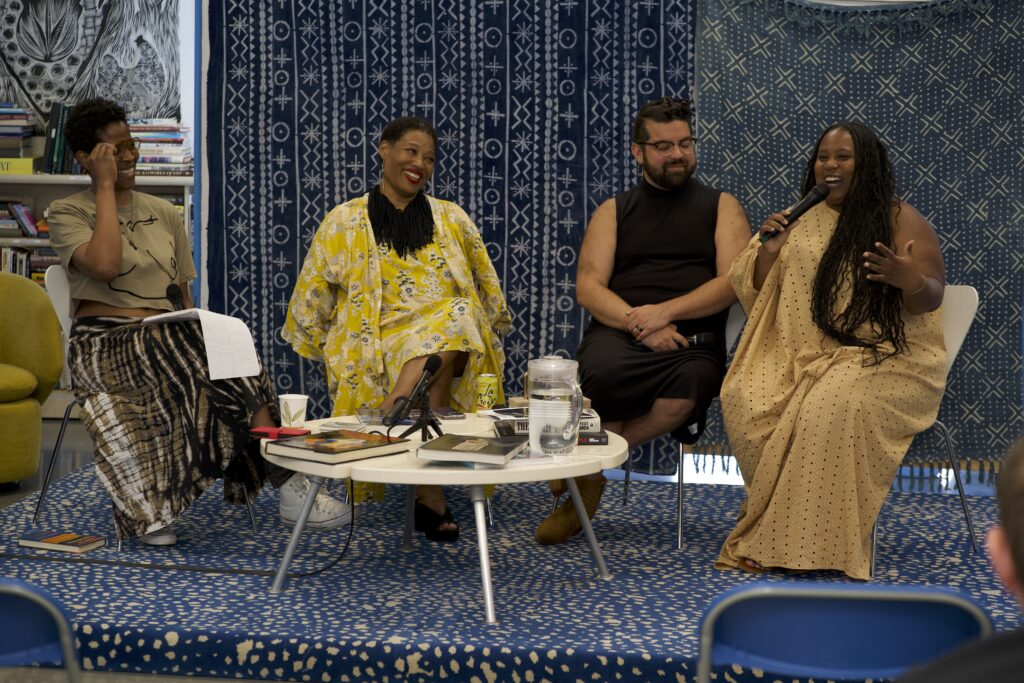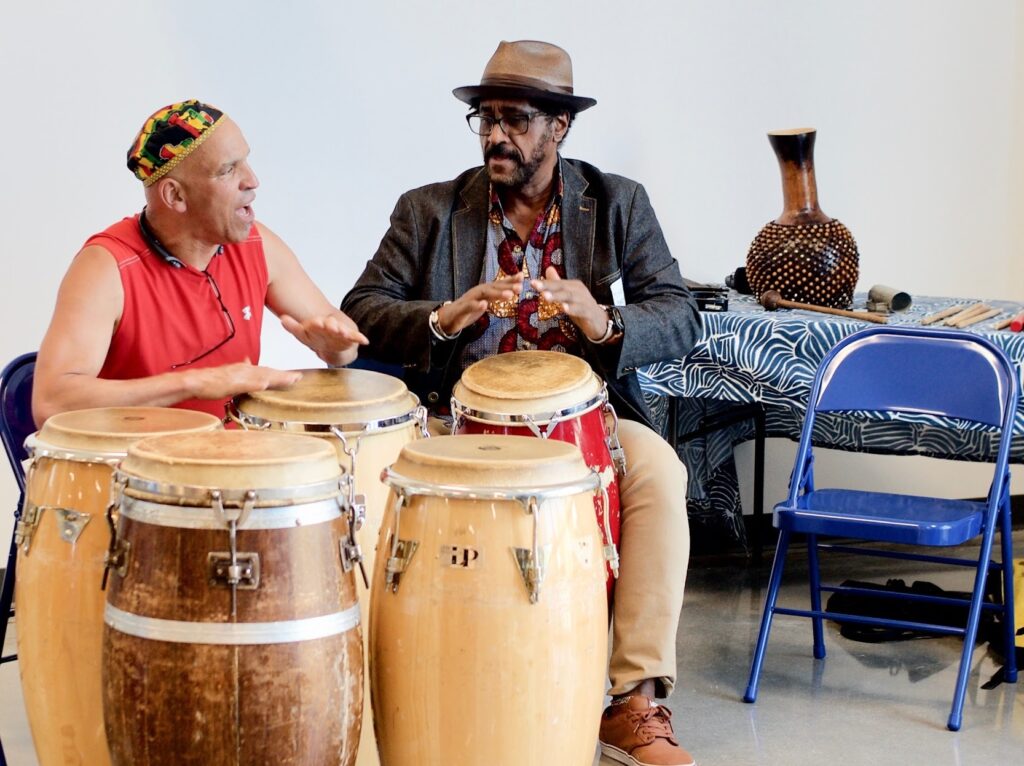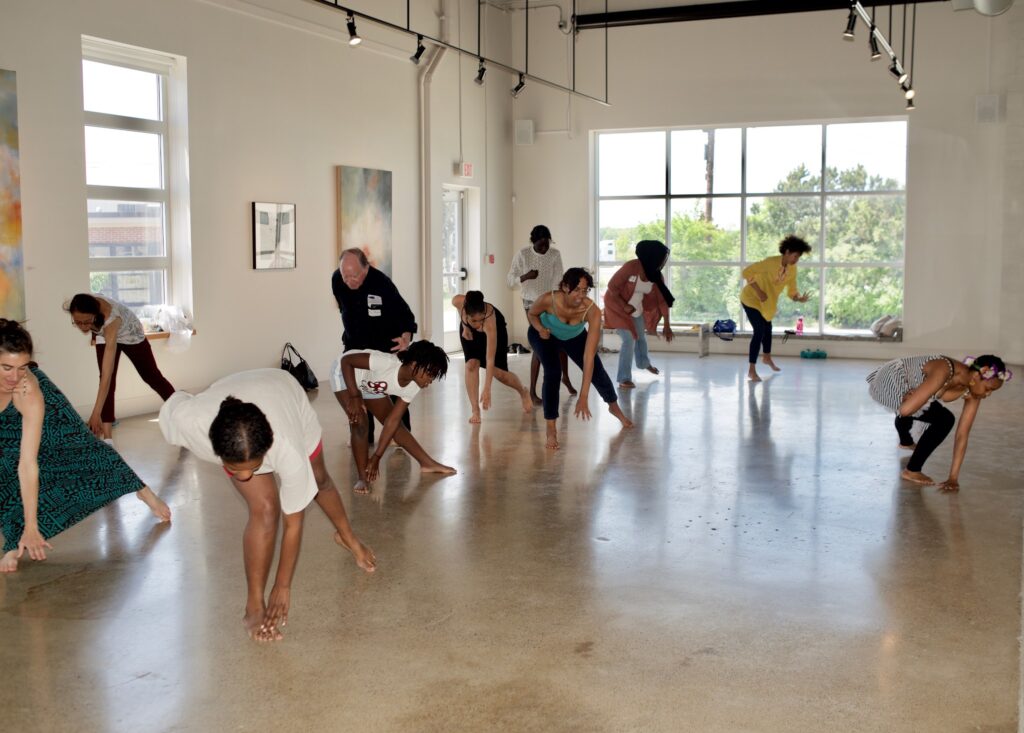
The Welcome Table:
the second edition: an invitation to gather, break bread and learn about the cultural and culinary traditions that nurtured social justice movements around the world.
Indigo Arts Alliance | 2024
As Indigo Arts Alliance enters our 5th year; not only will the return of this program serve as a moment to reflect and review our programming impact but it presents a moment for us to envision what the future of our community will be through an Afro + Indigenous multicultural and multigenerational lens. Since our conception there has been a clear distinction of our community before Indigo Arts Alliance and thus after. We have been a dynamic cultural connector; provided extensive scholarship by center black and brown brilliance; partnered and sustained relationships with local, national and global partners. Thus, this year’s 2024 symposium’s presentations, art workshops, and cultural conversations will ask these foundational queries:
- How does the power of creativity move us toward strengthening our multi-racial democracy via reconciliation, justice, and grace?
- How do we create, sustain, and nourish spaces of health and healing – in our communities and within ourselves? How do we offer reconstructive practices and models of engagement as alternatives for the future?
- How do we foster equitable and inclusive ways of engaging with one another reflective of other language families and cultures that have invested generations of blood, sweat, and tears in the building of this nation and the African diaspora?
This intergenerational symposium celebrates the cultural and culinary traditions drawn from worldwide social justice movements.
2024 Welcome Table Spotlight:
Featured scholars, activists, religious leaders, artists, culinary specialists and members of the public to explore the links among food, culture and spirituality with a view to greater international social justice. Confirmed panelists, scholars, speakers, and workshop leaders include:
- Artist and co-director of the Romare Bearden Foundation, Diedra Harris-Kelley
- Founder of Transparent & Black, African and Native American journalist and wellness expert, Yasmine Jameelah
- Yoga instructor of the Portland Yoga Project, Victoria Rutledge
- Author, community organizer, and religious leader in the Afro-Indigenous Brazilian tradition of Candomblé, Iyalorixá Valnizia Pereira Oliveira (Mãe Val)
- Author and associate professor/chair of the Department of Ethnic Studies at the University of Colorado (Denver), Dr. Rachel Elizabeth Harding
- Spoken word poet and advocate/consultant in the mental health field, Nyamuon (Moon) Nguany Machar (IAA AiR Alum ‘20)
- Sculpture and installation artist, Abigail DeVille
- Iranian multidisciplinary artist, Minoo Emami (IAA AiR ‘24)
- Chef and culinary educator, Dr. Scott Barton
- Providence, RI-based dance activist company, The Haus of Glitter
- Program Director at the Center for Black Visual Culture, Jamaican-American author and journalist, Joan Morgan
- Multidisciplinary Artist and 2020 Sarah Arison Artadia Awardee, Alexandra Bell (IAA AiR ‘22)
- Executive Director of Community Change Inc. and creator of Black Girl in Maine Media, Shay Stewart-Bouley
- Chair of Native American Programs and Associate Professor of Anthropology at The University of Maine, Darren Ranco

The Welcome Table:
an invitation to gather, break bread and learn about the cultural and culinary traditions that nurtured social justice movements around the world.
Indigo Arts Alliance | 2019
In 2019, for our grand opening, Indigo Arts Alliance presented The Welcome Table. It was one of our best-attended, and most highly praised events we have created. It was deeply and intentionally multicultural in both its audience and presenters. We were able to host the entire program at no charge to participants. Activities included a ritual of opening with prayer, African Dance and drumming, and continued with public lectures, and a rich variety of arts workshops, food demonstrations, shared meals and community conversations. The themes of food, activism, spirituality and community-building ran throughout the various activities.
Our workshops focused particularly on cultural and culinary traditions developed by African Americans, Native peoples of the Northeast, African nation citizens living in Portland, ME, LatinX Americans/including Afro Brazilians. We featured food demonstrations representing the cooking traditions of each of these groups – and explored the links between food and movement-building in the lectures. All participants discussed how convening over food became strategizing sessions for freedom movements in their respective countries/communities.

Dr. Rachel Harding shared stories she heard from mentor, Bernice Johnson Reagon, member of the SNCC Freedom Singers and founder of the women’s acapella group Sweet Honey in the Rock, talked about the role of food in the grassroots organizing campaigns in rural Georgia, Alabama and Mississippi during her days in the movement. She described the simple food – often just a pot of beans and some cornbread – that local Black folks cooked and shared with movement volunteers who came from around the country to help in voter registration work and desegregation protests. Reagon shared some of the history of southern African American cooking and the lesson in the generous hospitality of people who were poor but who had a great yearning for freedom/justice and a long tradition of collective survival.
Amid the cooking workshops and public lectures, The Welcome Table also included a series of wonderful arts workshops. Daniel Minter led printmaking workshops where participants used his rubber stamp designs – the “Keys” of southern and diasporic Black experience — to create striking pieces of art that they could take home.
A special highlight of the event was a culinary workshop and lunch prepared by Iyalorixá Valnizia de Ayrá and Marilene Pulfira de Jesus Cruz, elders in the Candomblé tradition of Bahia, Brazil. The women taught the preparation of acarajé (black-eyed pea fritters), ximxim de galinha (cashew and ginger sautéed chicken), and carurú (stewed okra with dried smoked shrimp and palm oil) – preparing enough for about 75 guests. After the meal, our guests from Bahia shared reflections on the significance of food as a resource for community-building in Afro-Brazilian religion; they also discussed the practice of intergenerational pedagogy as a form of cultural, social and spiritual “nutrition” in the Candomblé ritual community.
This gathering features art workshops, movement and meditation, cross-cultural history, community-building, and cooking led by local and national activists and cultural workers.

The Welcome Table is a term used in southern African American culture to describe a spiritual value; an ethic of hospitality; a space where no one is turned away and where the abundance of life is shared and enjoyed by all. It is a concept that was created by Black people in resistance to a society that often violently delimited their range of possibilities.
The Welcome Table represents the ideal of a place of gathering – to eat, to talk, to enjoy, to give thanks, to just BE – in a healthy, multiracial nation where there is room for all of us and all of our stories.
I’m gonna sit at the Welcome Table. Oh, I’m gonna sit at the Welcome Table one of these days, Hallelujah. The traditional African American religious song puts it this way: I’m gonna sit at the Welcome Table. Oh, I’m gonna sit at the Welcome Table one of these days, Hallelujah.
“Indigo Arts Alliance’s The Welcome Table 2019 was our inaugural symposium, which solidified a key point of difference for us as an artist-run arts residency. We activate the artist’s role as a social justice activist in collaboration with scholars, cultural workers, and everyday citizens. This gathering will continue to be a signature event for us because it embodies our commitment to the community, locally and globally. The Welcome Table demonstrates that we take seriously our responsibility to help build a “multi-racial democracy,” (in the words of Dr. King), no matter how long it takes.”
— Marcia Minter, 2024
Indigo Arts Alliance Co-founder
Chief Officer of Strategic Growth and Innovation
